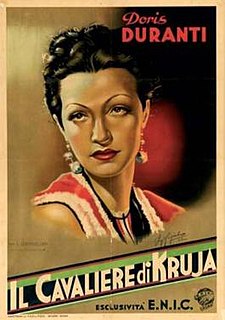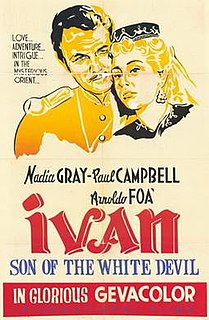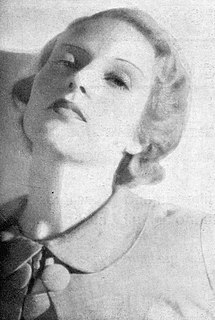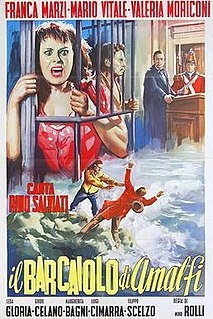Guido is a North American subculture and ethnic slur or slang term, often derogatory, for a working-class urban Italian-American. The guido stereotype is multi-faceted. Originally, the term was used as a demeaning term for Italian-Americans in general. More recently, it has come to refer to working-class urban Italian-Americans who conduct themselves in an overtly macho manner or belong to a particular working-class Italian-American subculture. The time period in which it obtained the later meaning is not clear, but some sources date it to the 1970s or 1980s. The term is not used in Italy.
Music in the Square is a 1936 Italian comedy film directed by Mario Mattoli and starring Milly, Ugo Ceseri and Enrico Viarisio.

La Cittadella is a 1964 Italian miniseries based on A. J. Cronin's 1937 novel, The Citadel, and produced by Radiotelevisione Italiana. It was directed by Anton Giulio Majano and stars Alberto Lupo as Dr. Manson and Anna Maria Guarnieri as his wife, Christine. Other television versions include an American (1960), another Italian (2003), and two British adaptations, 1960 and 1983.

Guido Celano was an Italian actor, voice actor and film director. He appeared in 120 films between 1931 and 1988. He also directed two Spaghetti Westerns: Cold Killer and Gun Shy Piluk. He was born in Francavilla al Mare, Italy and died in Rome, Italy.

Laura Nucci (1913–1994) was an Italian film actress. Nucci was one of the stars of the Fascist era, emerging after she won a competition. Her career was setback by the downfall of Benito Mussolini's regime, but from 1950 she began appearing in films again as a character actress. She also appeared in television, such as the 1957 series Pride and Prejudice.
The Charmer is a 1931 Italian comedy film directed by Guido Brignone and starring Armando Falconi, Tina Lattanzi and Ada Dondini. It is part of the White Telephone genre of films. It was shot at the Cines Studios in Rome.

The Cavalier from Kruja is a 1940 Italian war film directed by Carlo Campogalliani and starring Doris Duranti, Antonio Centa and Leda Gloria. The film portrays the 1939 Italian invasion of Albania. It was made as a propaganda work in support of the Fascist regime of Benito Mussolini.

L'Armata Azzurra is a 1932 Italian aviation docu-drama and adventure film directed by Gennaro Righelli and starring Germana Paolieri and Ennio Cerlesi. It was Italy's first aviation drama film, with a fictional story that celebrated the Italian Air Force.

Don Camillo's Last Round is a 1955 French-Italian comedy film directed by Carmine Gallone and starring Fernandel, Gino Cervi and Leda Gloria. It was the third of five films featuring Fernandel as the Italian priest Don Camillo and his struggles with Giuseppe 'Peppone' Bottazzi, the Communist mayor of their rural town. The film had 5,087,231 admissions in France.

Giuseppe Verdi, released theatrically in the US as The Life and Music of Giuseppe Verdi and on video as Verdi, the King of Melody, is a 1953 Italian biographical musical melodrama film starring Pierre Cressoy and directed by Raffaello Matarazzo. It is based on adult life events of the composer Giuseppe Verdi. The film was a commercial success, grossing over 957 million lire at the Italian box office.

Il padrone delle ferriere is a 1959 Italian-Spanish historical melodrama film written and directed by Anton Giulio Majano. It is based on the novel Le Maître de forges by Georges Ohnet.
Antonio Meucci is a 1940 Italian historical film directed by Enrico Guazzoni and starring Luigi Pavese, Leda Gloria, and Nerio Bernardi. It portrays the life of Antonio Meucci, the nineteenth century inventor and supporter of Giuseppe Garibaldi. The film was shot at the Cinecittà Studios in Rome.
Dimmed Lights is a 1934 Italian drama film directed by Adelqui Migliar and starring Fosco Giachetti, Nelly Corradi and Laura Nucci. The film was released in the United States in 1936, and is sometimes dated by that year.

Ivan, Son of the White Devil is a 1953 Italian adventure film written and directed by Guido Brignone and starring Paul Campbell and Nadia Gray. It grossed 345 million lire at the Italian box office.

La signorina is a 1942 Italian romantic drama film directed by László Kish and starring Loredana and Nino Besozzi. It is based on a novel by Gerolamo Rovetta.
The Knight of San Marco is a 1939 Italian historical drama film directed by Gennaro Righelli and starring Mario Ferrari, Dria Paola and Laura Nucci. It is set during the Risorgimento.

Golden Arrow is a 1935 Italian crime film directed by Piero Ballerini and Corrado D'Errico and starring Luisa Ferida, Guido Barbarisi and Ennio Cerlesi. It was screened at the 1935 Venice Film Festival.

The Boatman of Amalfi is a 1954 Italian melodrama film directed by Mino Roli and starring Mario Vitale, Franca Marzi and Guido Celano. The film's sets were designed by the art director Massimiliano Capriccioli. It is based on the 1883 novel of the same title by Francesco Mastriani.

Just Married is a 1934 Italian comedy film directed by Guido Brignone and starring Umberto Melnati, Leda Gloria and Ugo Ceseri.

Territorial Militia is a 1935 Italian comedy film directed by Mario Bonnard and starring Antonio Gandusio, Rosina Anselmi and Leda Gloria.













